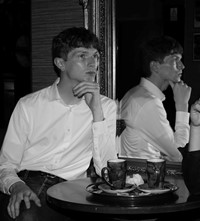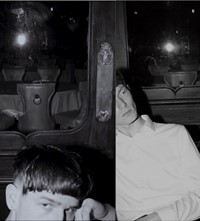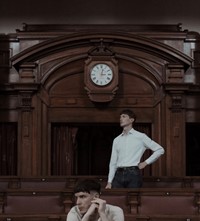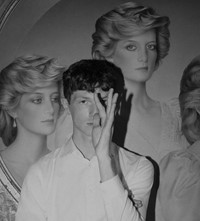As Another Man premieres Private World’s new single, Crisis Era, Dean Mayo Davies talks feng shui and spatial balance with Tom Sanders and Harry Jowett of the after-dark music duo
- TextDean Mayo Davies
“I’d walk home at night when nobody’s around. The daytime is heaving with buses and people and later on there’s not a soul anywhere. It’s that sense of solitude in a public place and the idea of imagining living in it. But it also has other connotations – it’s suggestive. Every person has a private world going on in their minds.” Singer and guitarist Tom Sanders is reflecting on Private World’s moniker, inviting and ambiguous as it is. There’s the sense the name can shift, like the focus on a camera lens, bringing new things into view – and blurring out the rest.
Joined by drummer Harry Jowett, the emerging band are making their mark by doing exactly the opposite: opening up. The production on their recent singles Crisis Era (premiered here) and Chasm is nothing short of immaculate, heralding a return to sophistication that’s simultaneously punctuating the fashion climate. Think (Brian) Eno, not demo. And the hands on the mix are their own.
“I feel like ultimately every band should know what they want their song to sound like, more than anyone,” says Jowett. “When you take it into your own hands, you future-proof the song. You make it a bit more timeless.”
There’s discreet excitement about a band where, on getting different speakers or headphones, they become new again, full of secret gift – like Depeche Mode or Roxy Music. Sanders and Jowett, meanwhile, compare their process to building an environment.
“Imagine you have an empty room to fill or decorate: you fill that room with furniture and ornaments while considering space, the balance and distribution of the objects within the room; the colours, the size, and how the order within the room can dictate satisfaction – like feng shui. Our approach is the musical equivalent: contemplative songwriting that considers proportion and balance. You’re arranging something with an intuition, you want to feel that balance of light and heavy, different textures.”
The cool air of sonic space is a seductive high – and once you’re aware of it, you realise how dense musicality is pretty much de facto, de rigeur yet not always deliberate. It might be a symptom of the overstimulated, post-internet brain that more is more... until you make a choice to breathe.
“A lot of the time when I’m going to write or I’m going to start tinkering with stuff, I arrange the room beforehand so I feel good,” explains Sanders, “and it’s the same when I get dressed in the morning,” he says. There’s something about the idea of environmental attunement: the artist (then designer) Helmut Lang told index magazine in a 2004 interview how he would need to re-arrange hotel rooms to be present. The creative mind hits every plane.
We’re sitting in a pub in the Roath area of Cardiff, not far from the studio where the band record with Tom Rees of Buzzard Buzzard Buzzard, themselves generating heat, and not far from home where they take their music back to finish – or really begin on it, such is their process: other elements are recorded with a man called Meirig, who trained on an analogue 24-track mixing desk and works with a tape deck. Elemental sound, it turns out, is more complicated than you think. Hailing from the city, the band are friends with everyone yet they’re not defined as a Cardiff band as the media is often keen to compartmentalise. An earlier EP, Passage was released through Australia’s Burning Rose label. In September, when LA’s Drab Majesty comes to play, they’ll support for a second time – the duo’s synth leanings group convincingly and unlike anyone else, their music has a distinctly after-dark feel, despite combining elements from new wave to new age pop.
Sanders and Jowett enjoy something of a creative shorthand going back nearly a decade, having played (and enjoyed success) in a punk band, Pipedream. Their ears wear their history with the souvenir of piercings, even if their style has cleaned up. Private World’s music has appeared in skate films and their roots contribute an essential human energy, especially live, where they’re joined by other musicians. They’d like to work on a soundtrack too one day. A Gregg Araki film, you’d think, could be a great fit.
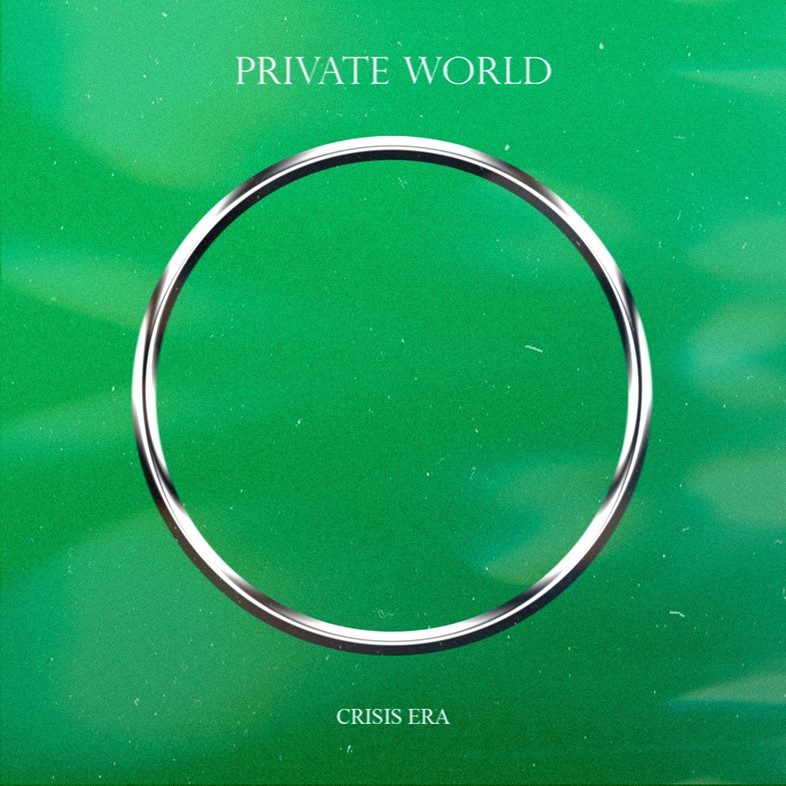
“With our songs, there’s always a colour,” Jowett explains.
“There’s 100 per cent an element of synesthesia,” continues Sanders. “Jesse Feinman, who’s done artwork for Boy Harsher and Snail Mail, did the artwork for Passage and was given a colour scheme from the songs; these full shades of colour that are very different from each other.”
Crisis Era is “green and silver”. So the sleeve by Dafydd Jones is exactly that.
“We're sitting on a lot of material,” Sanders shares. “It’s just kind of like, what do we need it for? When are we going to release it? How do we want to release it?”
“We’re pacing it,” Jowett concludes. Inevitably when an album comes calling – they’ve had offers, but the offers need to be right, and they are as careful about this as everything else – the band won’t be re-recording their singles to what they should’ve been in the first place. There’s no need. Pretty radically for a young band in 2019, Private World deals in classics. They’ll do some more.
Crisis Era is on Spotify and Apple Music now, along with the band’s other releases.
